Inside BASIS, the School That Aims to Be World Class
How a Brooklyn school, part of a larger chain, teaches students as Europeans and Asians do
This article was produced in partnership with The74Million.org, a non-profit education news site based in New York City. Get more news about NYC schools by signing up for The 74 Newsletter.
Why was her fourth-grader holding a medical school exam prep book?
That was Radha Subramanyam’s first reaction when she looked over her daughter Tara’s shoulder as she studied the human circulatory system. It wasn’t really an MCAT book, just a science book from the new school Tara had recently transferred into. Still, the diagrams of the heart had far greater detail than anything Tara had brought home before.
“I remember commenting, ‘What, you’re going to [study] that?!’ ” Subramanyam recalled. But Tara wasn’t fazed. Instead, “she rattled off everything that happens to the blood and the inferior vena cava and the superior vena cava and all of this information in a second.”
Tara attends BASIS Independent Brooklyn, part of a chain of 27 public charter, private, and international schools in five states, Washington, D.C., and China that recently captured four of the top five spots on U.S. News and World Report’s annual ranking of America’s best high schools. BASIS makes advanced, immersive coursework a requirement for all students, from pre-K through high school—an approach that some dub “deep content.” But for co-founder Olga Block, there’s nothing extraordinary about such comprehensive study; it’s simply the way she was taught as a child growing up in Czechoslovakia.
Now nearing its 20th anniversary, BASIS has molded its curriculum, and built its considerable reputation, around this “deep content” model as well as other best practices imported from abroad. Taking the lead from nations that score at the top on international exams, BASIS adopted matriculation tests that kids must pass to advance to the next grade; following Korea’s focus on educator credentials, BASIS insists that its teachers be experts in their fields and boasts a teaching corps where 70% of instructors have at least a master’s degree in the subject they teach; adopting Finland’s approach of boosting attentiveness through play, BASIS gives its youngest students extra recess; and following Olga’s experience in Prague of students owning their learning, BASIS gives kids a communication journal to transport between home and classroom—making students responsible for updating their parents on lessons, priorities, and grades rather than providing an online academic portal.
It’s a complex stew of a school design, and one that seems to be connecting with students like Tara. On international tests, BASIS schools are beating those top-performing countries they’ve borrowed from. The four-year adjusted cohort graduation rate for BASIS’s charter schools is 98%, according to the U.S. Department of Education. (BASIS says it doesn’t have college persistence rate numbers but is working toward this goal.) The network’s schools score better on PISA-based tests than the top-ranking countries do. Meanwhile, average U.S. scores on these exams have remained stagnant in the middle of the pack.
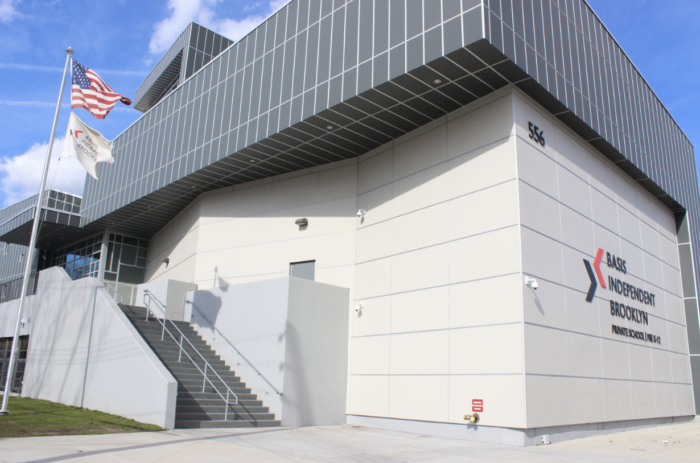
BASIS Independent Brooklyn, now wrapping up its third year in the borough, is situated on Columbia Street in Red Hook. The Brooklyn school is one of 27 private, charter, and international schools in the network that is nearing its 20-year anniversary. (All photos of BASIS by Kate Stringer)
Families see almost immediately that expectations are high. Tara, now a fifth-grader, is already learning algebra. Her brother, Rohan, and his third-grade peers are studying Mandarin; Tara is learning Latin. By the time she is in sixth grade, she’ll be taking nine classes—including biology, physics, and chemistry. When she’s in high school, she’ll take an average of 11 AP courses and, if the school’s pattern holds, pass with flying colors. She’ll spend her entire senior year working on her capstone, which involves an intensive research project and an internship or similar off-campus placement studying an area of interest, from inefficient food aid systems in the Middle East to the ethical implications of campaign finance reform.
It’s a challenging model of education—something BASIS’s founders have touted over the past two decades—and attrition rates indicate that it’s not for everyone. Critics decry BASIS’s exacting standards and emphasis on testing. But at a time when American schools are often derided as too easy compared with the classroom rigor found in other countries, some parents and students seem ready for more.
In fact, Subramanyam was already dissatisfied with Tara’s city public school when her daughter discovered BASIS by accident a few years ago at an outdoor fair in Brooklyn. After sampling the activities at the school’s booth, she told her mother she wanted to transfer in—which was fine with her mom, who grew up in India and was worried about the lack of emphasis on math and science that she saw in U.S. schools.
For their family, BASIS is providing an answer. “There are times when it seems a little bit challenging, but children are more than capable of doing more than we give them credit for,” Subramanyam said, remembering her initial shock over her daughter’s science book. “That was one of those ‘aha!’ moments.”
A dual origin story
The story of BASIS and its founders is also the story of a marriage, said Mark Reford, BASIS’s chief business development and brand officer. Olga and Michael Block were economics professors who met in 1992, when Michael was teaching a seminar in Austria that Olga attended. Michael was American; Olga had grown up in Prague, when her country was still called Czechoslovakia. They got married, and Olga moved to the States in 1996. But she became increasingly concerned by the lack of rigor in the schools attended by her daughter, Petra, in Arizona. At the same time, Michael was noticing that the international students in his classes at the University of Arizona were always much better prepared than their American counterparts.
So, in 1998, the Blocks decided to start their own charter school in Tucson. They were K-12 outsiders and adopted practices that many criticized as too difficult. A second school, in Scottsdale, opened in 2003, followed by a third Arizona school in 2010. BASIS has opened multiple schools every year since.
As the network expanded, it also drew attention for high attrition rates, leading critics to question whether BASIS was for all students. In a 2006 Arizona Republic article, Olga tells of a sixth-grader who bombed her matriculation exam. She asks Olga if she has the legal right to fail her. “ ‘Yes, baby, I do,’ Olga recalls saying. ‘If you don’t like the rules, please don’t come.’” The article added that 40% of the eighth-graders at the Tucson school decided not to attend the neighboring BASIS high school.
The issue arose again in 2013, when Washington, D.C., refused to allow BASIS’s year-old charter school there to expand, citing attrition as one reason. Then-Head of School Paul Morrissey told The Washington Post that BASIS schools always have higher attrition in the first year, as the community becomes accustomed to the high level of academic rigor.
“When a BASIS school comes into a new market, there are students who understand and know what the workload is and what it takes to be successful at BASIS, and there are students who are not prepared to do that kind of work,” he said.
But BASIS has made some changes to help students adjust, such as starting science instruction in the younger grades and stretching some Advanced Placement courses over two years. BASIS Independent Brooklyn, which opened in 2014, reports that 93% of families returned to the school last year.
“I think the distinguishing factor for successful students is that they’re willing to work hard and that they’re invested in academics,” said Julia Toews, the network’s vice president of academics. “It’s really a program designed to make success achievable for the average student now.”
BASIS Independent Brooklyn, one of five private schools run by the network, has an admissions exam. But the majority of BASIS schools—21—are public charter schools that admit their students by random lottery. “Deep content cannot just be for the smartest kids,” Reford said.
Overall, the nearly 18,000 students at BASIS—which operates in New York, Texas, California, Virginia, Arizona, Washington, D.C., and Shenzhen, China—are 40% white, 35% Asian/Indian, and 25% Hispanic, African-American, and multiracial. BASIS says it does not track family income, but its two San Antonio charter schools report that 6% to 7% of students are economically disadvantaged, while the D.C. school reports a rate of 20%.
And the network is growing. A private school in Manhattan is set to open this fall, and an international school in Prague is scheduled for 2020.
Test-based mastery
“S-T-U-D-Y. It’s study time and you know why!”
On a February morning, students at BASIS Independent Brooklyn watched, wide-eyed, as history teacher Matthew Goldman stomped his feet and shouted the words to a song he’d projected on the whiteboard for the students to sing. Some kids giggled too hard to speak. One pulled his hood up in feigned embarrassment. Still, they clapped along to the silliness, and soon their chanting began to feel like a rallying cheer before a big game.
That’s because there would be a big game, the following week. The pre-comp exam, sort of like a midterm, was coming up, and it was worth 5% of the middle schoolers’ total grade. The test covered everything they had learned so far and demonstrated how ready they would be for the comprehensive exam they’d take at year’s end. The comp is worth 50% of the overall grade, and a passing score is required for grade advancement.
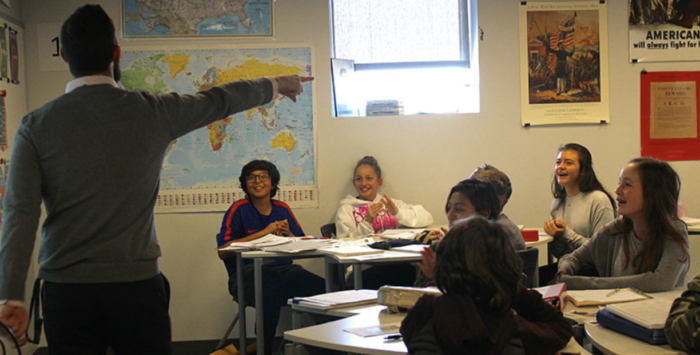
History teacher Matthew Goldman leads his students in a pre-comp exam chant in February
Kate Oldre, BASIS Independent Brooklyn’s director of student affairs for grades 5 to 10, walked through the halls the week before the pre-comp, pointing out what classes were doing to prepare for the exam. Though it’s a big test, the mood was light in most classrooms. Students were laughing, running up to their teachers to check answers, and shouting questions to their classmates. None of them had been assigned homework that week, so they could spend time studying.
“There’s no such thing as a high-stakes exam if you are prepared,” Oldre said.
The following week, elementary students filled the hallways with posters to encourage their older peers. “I hope you have a good test! Do your best!” one said, in scrawling red handwriting. Another depicted a green dinosaur with “100% A+” tattooed to its side. Algebra teacher Jessica Wolf wore a green shirt that read “Keep Calm and Show Your Work.”
At BASIS, there is no social promotion. Middle and high school students advance to the next grade only by passing their classes and year-end exams (BASIS has a weighted formula for calculating AP scores into student grades and shares that with colleges). If students don’t pass, they get one chance to retake the comprehensive test over the summer.
“Holding kids to that mastery has been one of the main reasons for our success,” Toews said.
BASIS high schoolers are required to take six AP exams (the network pays the fees for charter school students), but the average student takes 11.5, earning an average score of 3.7; 84% pass with a 3 or higher. Nationwide, in 2016, 57 % of students passed their AP exams; the average score was 2.85.
Testing for mastery and matriculation is a staple of the world’s top-performing nations, including the Czech Republic, Japan, Korea, and Finland. According to a report by the Organisation for Economic Co-operation and Development, countries that require students to pass standards-based exams in order to move to the next grade or enroll in college score 16 points higher on the Programme for International Student Assessment (PISA) exam than those that don’t.
So it may not be a surprise that when Amanda Ripley, author of The Smartest Kids in the World, surveyed 202 foreign exchange students for her book, she found that 9 out of 10 international students who studied in the U.S. thought American schools were easier than schools in their home countries. Seven of 10 American teenagers who went abroad agreed. “School in America was many things, but it was not, generally speaking, hard,” Ripley wrote. A recent Brown Center Report on American Education found similar results.
In her book, Ripley gave BASIS a shout-out for its international testing performance, while describing demanding schools like it as “countercultural places, though, with leaders spending a lot of time telling parents their students are tougher than they think.”
But with that rigor comes passion. Senior year is devoted to letting students discover a subject they are passionate about, research it intensely, and then create a presentation on their findings. This idea originated from Toews’s experience working with undergraduates who had great SAT and AP scores but “lacked a fundamental ability to be interested” and wanted detailed instructions for everything they did.
For one project, a senior at BASIS Tucson North Charter School went to live with her grandparent for three months in Poland, where she worked in a lab studying genes in a microscopic worm. Another student, who was born in India but lived in Silicon Valley, studied how the local bike-sharing program compared with the one in his birthplace of Bangalore.
“The kids, they came back grown up,” Towes said. “They were self-possessed.”
Valuing teachers as experts
Getting into a teachers college in Finland is as difficult as getting into MIT, according to Ripley, who studied Finland’s education model for her book. In Finland, teachers spend years studying the subject they will teach, in addition to learning instructional techniques. In Korea, elementary school teachers are some of the most highly educated professionals in the country, coming from universities that admit only the top 5% of applicants, according to Ripley.
BASIS’s founders wanted to bring this level of educator prestige—which Michael Block has called the “secret sauce”—to U.S. classrooms. So he and Olga decided to hire only teachers who had a degree in the subject they were teaching, to evaluate them based on how well students perform, and to pay bonuses for good work. Now, more than 70% of their teachers have at least a master’s degree in their subject area.
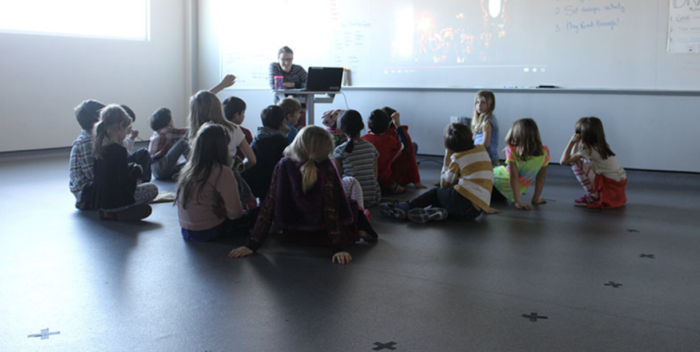
Teachers serve as professional resources for one another, collaborating within and across schools to share best practices or teaching materials. Expert teachers scattered around the network serve as subject advisers on the shared curriculum, provide their own online syllabi for new teachers to copy or modify, if they wish, run webinars, and hold monthly Skype conversations.
“It’s those people who are actively teaching in the classroom who have their finger on the pulse of what is working and what is not working,” Toews said.
Being able to collaborate across the U.S. and internationally has helped BASIS teachers create better exams: When the network realized its in-house tests had too many American cultural references for students at the Shenzhen campus to understand, it changed the questions.
BASIS also splits up its elementary teachers in a co-teaching model called LET/SET, or Learning Expert Teachers and Subject Expert Teachers. LETs are responsible for one group of students, sitting in on most every class with them and making sure they understand the material and stay on task. SETs teach the subject classes, able to specialize in one discipline and take the time they need to prepare lesson plans because they share responsibility for their students.
Taking a break, and owning their education
In an open-air space inside BASIS Independent Brooklyn’s building, elementary school students race around in their winter coats, tumbling over large blue blocks that they’ve constructed into a sort of fort. Playtime is one of the simplest of BASIS’s borrowed global best practices. In Finland, students get a 15-minute break for every 45 minutes in class, which researchers have found increases attentiveness. BASIS gives its kids in grades K-3 three 15-minute blocks of playtime throughout the day, in addition to lunch, physical education, and a morning snack.
Another simple tool comes in the form of an 8½”-by-11″ spiral notebook owned by every BASIS student that, at first, drives parents crazy. Many schools create an online grade portal that allows parents to see how their children are performing. BASIS doesn’t. Any information about grades comes to parents because their kids have shown them the contents of their planner, which contains test scores, homework assignments, and notes to see the teacher after school for help.
This idea, which originated from Olga’s experience as a student in Prague, is designed to make students responsible for their own learning. “If they’re working for someone else, they’re never going to be successful,” Toews said. “If they’re working for themselves, they can take that skill anywhere.”
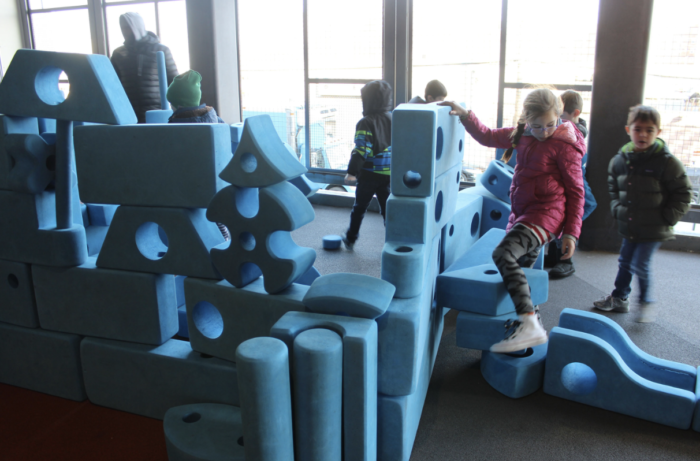
BASIS elementary students play with blocks in a half-indoor, half-outdoor recreation room. BASIS gives its K-3 kids three 15-minute periods of playtime throughout the day, in addition to lunch, physical education, and a morning snack
She recalled when her daughter was a fifth-grader at BASIS Tucson North, where Toews was the principal. Her daughter brought home a test on which she had received a D, a first for her. The test required mom’s signature. “I looked at her and said, ‘Well, what are you going to do?’ and she responded, ‘Oh, I’ve assigned myself to go see the teacher on Thursday,’ and she had written it in her planner,” Toews said, noting that this system makes students take responsibility for fixing problems. “Rather than [seeing it as] a terrible failure, ‘Oh, there’s a solution, and it’s in my planner.’ ”
Global standards, global students
A few months ago, Subramanyam’s daughter, Tara, stood on stage in front of a red curtain. The fifth-grader twiddled a microphone cord as she glanced at her notecards, then whipped through facts about pollution in China and India. But her main point took a more personal tone.
“When we go outside on a normal school day to recess, we take the air that we breathe in for granted,” she said, staring into a camera. “Well, Chinese can’t do that. It’s unhealthy for them to breathe the air. Some children are wearing gas masks to school because the air is so horrible.”
Tara’s presentation was the culmination of a new BASIS extracurricular called the Cultural Ambassadors Program. In partnership with graduate students from Columbia University, the BASIS kids researched global issues and recorded video presentations on their findings.
The program is one step toward creating what the network hopes will be a more empathetic student population ready to tackle global issues. Another is the Global Classroom Project, which connects kindergartners in different BASIS schools virtually to help them learn about one another. In one project, the children exchanged pictures of their local grocery stores so they could compare them. They also sent the Shenzhen school a video of second-graders sharing a Lunar New Year greeting in Mandarin. The plan is to expand the Global Classroom Project with each grade, so the students grow up alongside their national and international peers and have a global connection to them.
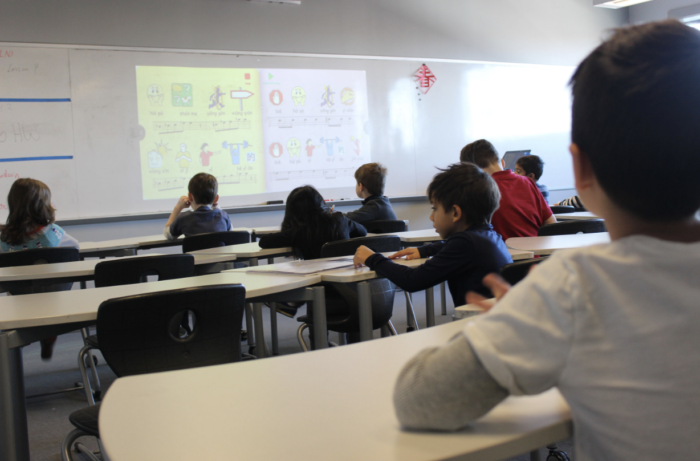
Elementary students at BASIS learn a song as part of their Mandarin lessons
“We want them to think about the world and their place in the world at a young age,” said Ross Cunningham, who leads the project at BASIS Independent Brooklyn. “We want kids to solve problems and understand what everyone’s problems are other than just their own.”
BASIS is also going beyond virtual connections to give students firsthand experience with different cultures. This year, the Brooklyn school is hosting its first visiting student from China, and the network plans to begin an international exchange program among BASIS schools.
“We wanted students to focus on something outside of their own worldview to see a larger world,” said BASIS Independent Brooklyn Head of School Hadley Ruggles.
“There is something beyond just your ZIP code.”
Editor’s note: The editor of The Bridge has a son in 8th grade at BASIS Independent Brooklyn.










